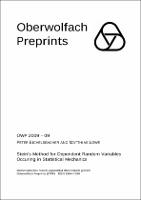Abstract
We obtain rates of convergence in limit theorems of partial sums $S_n$ for certain sequences of dependent, identically distributed random variables, which arise naturally in statistical mechanics, in particular, in the context of the Curie-Weiss models. Under appropriate assumptions there exists a real number $\alpha$, a positive number $\mu$, and a positive integer $k$ such that $(S_n-n\alpha)/n^{1-1/2k}$ converges weakly to a random variable with density proportional to $exp(-\mu|x|^{2k}/(2k)!)$. We develop Stein's method for exchangeable pairs for a rich class of distributional approximations including the Gaussian distributions as well as the non-Gaussian limit distributions with density proportional to $exp(-\mu|x|^{2k}/(2k)!)$. Our results include the optimal Berry-Esseen rate in the Central Limit Theorem for the total magnetization in the classical Curie-Weiss model, for high temperatures as well as at the critical temperature $\beta_c=1$, where the Central Limit Theorem fails. Moreover, we analyze Berry-Esseen bounds as the temperature $1/\beta_n$ converges to one and obtain a threshold for the speed of this convergence. Single spin distributions satisfying the Griffiths-Hurst-Sherman (GHS)inequality like models of liquid helium or continuous Curie-Weiss models are considered.

